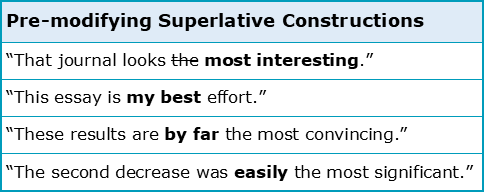Which superlative expressions are academic?

This is the fifth and final chapter about Comparatives and Superlatives. To complete this reader, read each chapter carefully and then unlock and complete our materials to check your understanding.
– Explore negation and pre- and post-modification for superlatives
– Provide a list of useful academic adjectives and adverbs
– Give examples for twelve useful superlative academic sentences
Chapter 5
While superlative expressions such as ‘Pizza is the most delicious food’ are more commonly used in informal speech than in academic writing, there are still a wide variety of expressions that may be useful for those requiring the English language for academic purposes. This fifth and final chapter about comparatives and superlatives therefore aims to provide some of the most helpful superlative expressions for the reader, outlining also a short list of common academic adjectives and adverbs. Before turning to these words and expressions however, there are three considerations omitted from Chapter 4 that should be discussed here.
1. Negating Superlative Expressions
We already know that an adjective or adverb may by used to create superlative expressions either by adding the suffix ‘-est’ or by preceding that word with ‘most’. Such constructions allow for positive comparisons in which the property being described is at one end of the spectrum, but how do we describe the opposite end? There are two simple rules to follow here:
i) use the word ‘least’ instead of ‘most’:
“She’s the least athletic person on the team.”
ii) use an adjective or adverb that demonstrates the opposite meaning:
“She’s the least slow person in the race.” X
“She’s the fastest person in the race.”
2. Pre-modifying Superlative Expressions
While you may have noticed that the definite article ‘the’ is necessary in superlative constructions that precede a noun, if there’s no noun present or if the expression follows a linking verb (such as ‘be’, ‘look’, ‘seem’ or ‘taste’) then the article ‘the’ may be omitted from the construction. Possessive adjectives such as ‘my’, ‘his’ or ‘their’ may also be used in place of ‘the’, as is normal for determiners:

What’s also noticeable in the above table is that by using expressions such as ‘by far’ and ‘easily’, superlative expressions may also be strengthened or emphasised.
3. Post-modifying Superlative Expressions
Likewise, superlative constructions may be strengthened or emphasised by following those constructions with the phrase ‘of all’:

Which superlative expressions are useful for academics?
Below are some expressions that you may wish to use or modify within your own academic writing. By paying careful attention to the twelve superlative expressions that have been bolded for you below, you may notice that academic expressions such as these rarely (if ever) use the suffix ‘-est’:
abstract, adequate, beneficial, certain, competitive, comprehensive, consistent, detailed, distinct, essential, favourable, frequent, important, influential, innovative, likely, misleading, obvious, practical, productive, realistic, salient, scientific, significant, social, suitable, sustainable, unlikely, useful, valuable, widespread
accurately, carefully, clearly, commonly, directly, effectively, frequently, notably, quickly, readily, significantly, strongly, successfully, unevenly, widely
“This is the most abstract theory I’ve ever studied.”
“The results of this study were the most beneficial to our research yet.”
“He presented most clearly about the global increase in carbon emissions.”
“Smith’s (2010) study was the least comprehensive of his career.”
“This graph shows the least favourable results.”
“Modern research most frequently uses digital methods and techniques.”
“The most innovative method was selected for use in this study.”
“This is because triangulation was the least practical method.”
“However, there are three reasons that this result is the most significant.”
“Wind is the most sustainable energy source in the UK.”
“The government distributed these resources most unevenly.”
“This tribe is now the least widespread of the indigenous population.”
To reference this reader:
Academic Marker (2022) Comparatives and Superlatives. Available at: https://academicmarker.com/grammar-practice/affixes/comparatives-and-superlatives/ (Accessed: Date Month Year).
Downloadables
Once you’ve completed all five chapters about comparatives and superlatives, you might also wish to download our beginner, intermediate and advanced worksheets to test your progress or print for your students. These professional PDF worksheets can be easily accessed for only a few Academic Marks.
Collect Academic Marks
-
100 Marks for joining
-
25 Marks for daily e-learning
-
100-200 for feedback/testimonials
-
100-500 for referring your colleages/friends